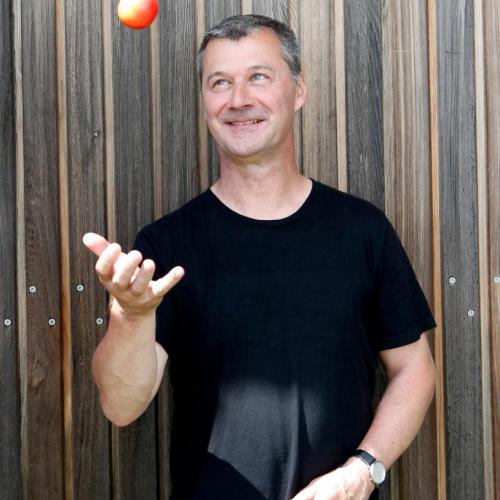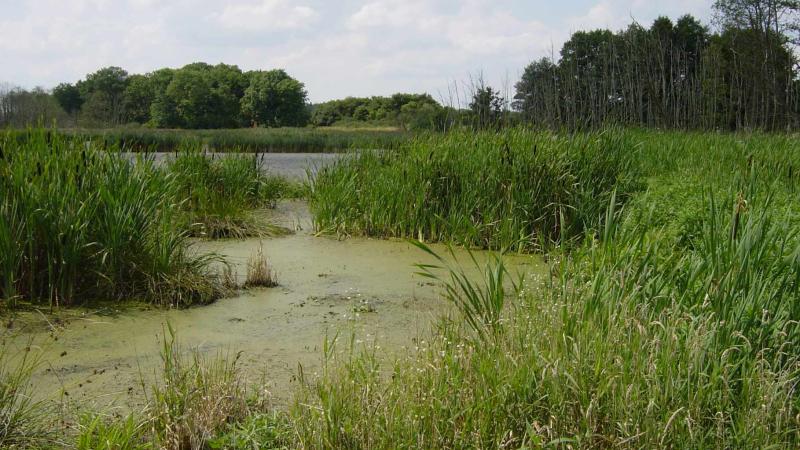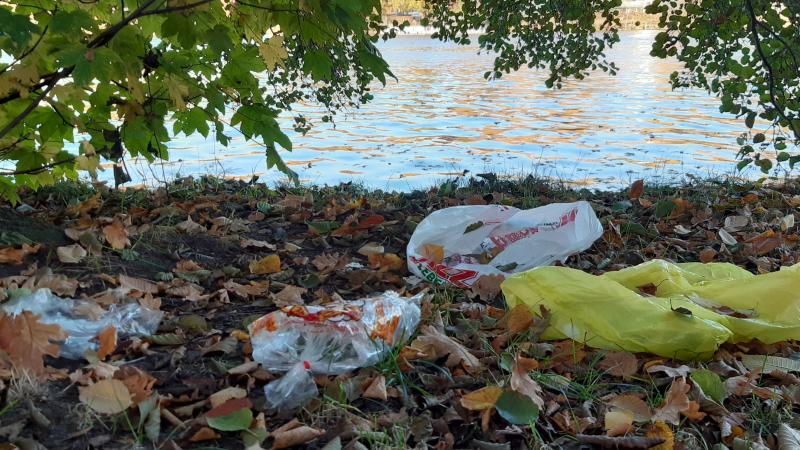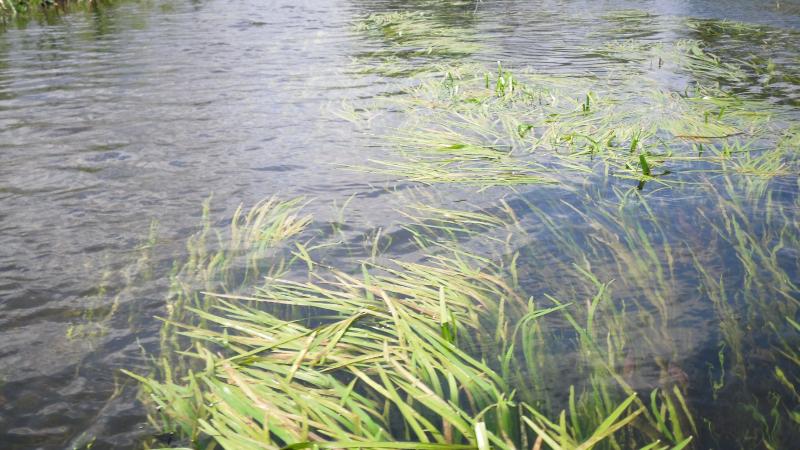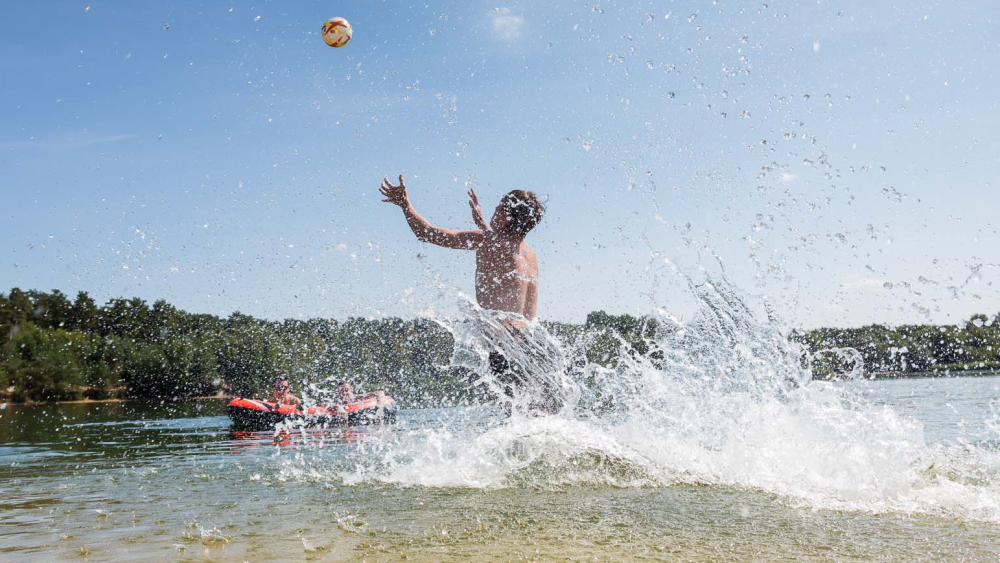
Water bodies are simply fun in summer. | Photo: Florian Möller, AVN

Photo: Beate on pixabay.
1. Sunscreen and mosquito repellent: not harmless to aquatic life
Health comes first, so it is of course advisable to apply sunscreen when the sun is shining. But make sure you let it soak in well. Sunscreens contain chemical-organic UV filters. One of these is octocrylene. Sunscreens containing this substance should probably be avoided. Professor Werner Kloas, who researches the effects of environmental chemicals on amphibians and fish at the IGB, thinks that octocrylene still needs to be further studied, also with a view to developing well-founded guidelines for water quality: "Studies in rats have shown that this substance reduces the production of thyroid hormones, which are important for growth and development. Other studies have shown that octocrylene in water can harm organisms such as water fleas, ciliates and fish. It is also likely to harm amphibian larvae, which are particularly sensitive to disruption of the thyroid hormone balance. In the sea, it damages corals.
Mosquito repellents are not harmless either. Icaridin, a substance commonly found in these products, has been shown to be harmful to salamander larvae during metamorphosis.

Photo: Manfred Antranias Zimmer on pixabay.
2. Cigarette butts: Don't flick them down the drain or into the water
Nicotine is highly toxic, not only to humans but to all creatures, including those in the aquatic environment. Cigarettes also contain other harmful substances. So, of course, cigarette butts don't belong in the lake or river. But even if they are thrown on the banks or flushed down the drain, they can cause problems in freshwaterr ecosystems. This is because nicotine is highly soluble in water, and when it rains, about half of the nicotine from the butt leaches out after just 30 minutes. In 2019, the team, led by IGB researcher Dr Markus Venohr, measured nicotine concentrations in various surface waters in Berlin: "After rainfall, nicotine concentrations increased significantly in almost all water bodies analysed, most strongly in canals connected to the sewerage system, where they increased by an average of 16 times. But nicotine levels were also high in bathing lakes such as the the lake Krumme Lanke in summer when it was dry."

Photo: kerplode on pixabay.
3. This is where it gets private for a moment: peeing in the water
Don't worry, we'll change the subject in a moment. But we wanted to make it clear once again: Peeing in water really isn't nice, but in larger lakes it doesn't harm the environment. The nutrients in urine are too diluted for that. The situation is different with urine from cows and pigs, which is flushed from the fields into the water as concentrated fertiliser. The nitrogen and phosphorus compounds it contains promote algae growth and are one of the biggest problems for the water quality of lakes. For smaller lakes, however, urine from swimmers can represent an additional burden that can be avoided, right?

Photo: Nowaja on pixabay.
4. Go boating but save the reeds!
Boats without motors are allowed to navigate outside the fairway. But they should keep their distance from the reed belt because waterfowl find refuge there and the reeds have been declining in many European lakes since the 1950s. A study led by IGB and the Humboldt Universität zu Berlin has shown that mechanical stress caused by the impact of waves from shipping, shore obstructions, feeding damage from water rats and nutrias, and pollutants such as sulphate are responsible for reed declines. So please do not cause any additional damage.

Photo: Marzena P. on pixabay.
5. eFoils and flyboards: Floating underwater sound machines
It is a fascinating spectacle to see how the e-foils make people float on the water. What's more, this electrically powered surfboard with a large fin on the underside is whisper-quiet – at least above the surface. Under water, however, this new leisure activity makes a lot of noise. Researcher and sound artist Francisca Rocha Goncalves recorded the background noise in Berlin's Lake Müggelsee lake using underwater microphones: "The eFoils add a less common frequency to the general background noise under water. It is higher than that of motorised boats, between seven and nine kilohertz." However, the impact on fish and other wildlife has not yet been studied, als the technology is too new. Flyboards also fall into the category of “underwater sound machines“. So here is just food for thought to look beyond the horizon of human perception. This is what the eFoil sounds like under water >

Photo: ratucette on pixabay.
6. Do not feed ducks and fish
Bread does not belong in the water. Firstly, it is unhealthy for waterfowl because it is high in salt or can go mouldy. Secondly, it pollutes the water, which is already stressed in the summer, with nutrients that stimulate the growth of algae. For these reasons too, feeding waterfowl is forbidden in many cities, such as Berlin.

Photo: Manfred Antranias Zimmer on pixabay.
7. Swimming only at designated bathing areas
For safety reasons, the German Life Saving Association (DLRG) recommends swimming only in official bathing areas. We can only agree with this. This is because, in addition to ensuring the safety of swimmers, efforts are made at these sites to maintain a balance between the human use of the water and the protection of nature: Litter is regularly removed, protected areas are marked or fenced off, and so on. Otherwise, any use of the banks and waters could lead to damage to bank structures and plants in this sensitive area and disturb the animals.
Read also: What's up in the lake? Off to the lake for a swim. But what swims, grows and crawls in water? Researchers from IGB provide a little expert knowledge for your outdoor fun at the lake.


